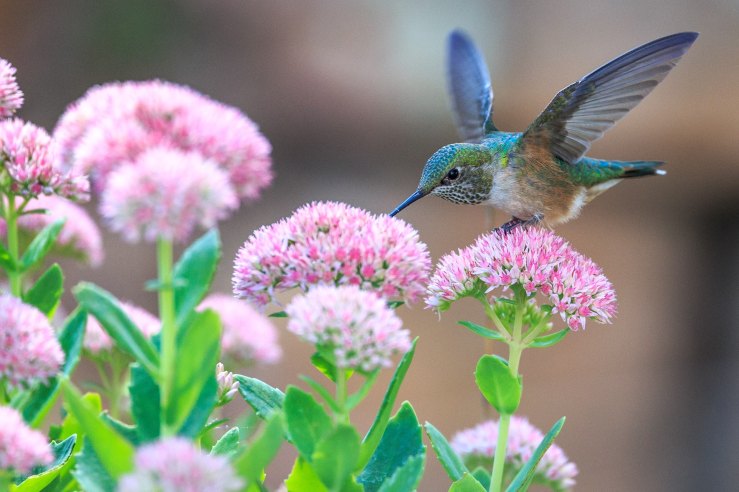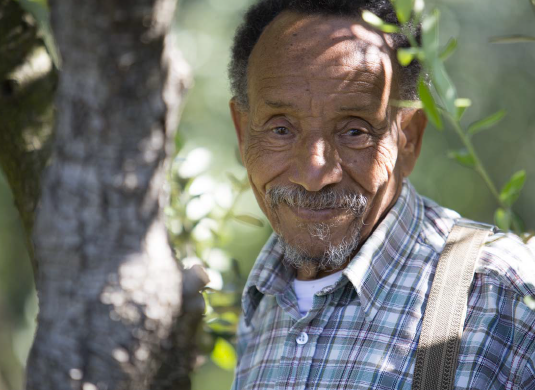
One day, a long time ago and in a faraway place, or so the legend goes, there was a huge forest fire that was raging the countryside. All the animals were terrified, running around in circles, screaming, crying and helplessly watching the impending disaster.
But there in the middle of the flames, and above the cowering animals, was a tiny hummingbird busy flying from a small pond to the fire, each time fetching a few drops with its beak to throw on the flames. And then again. And then again.
After a while, an old grouchy armadillo, annoyed by this ridiculous useless agitation on the part of the hummingbird, cried out “Tiny bird ! Don’t be a fool. It is not with those minuscule drops of water one after the other that you are going to put out the fire and save us all !”
To which the hummingbird replied, “Could be, but I’m going to do my bit.”
This is the Hummingbird’s Tale told by Pierre Rabhi.
The connection between this autor, poet, philospher and environmentalist, and pedagogy doesn’t seem obvious. However, we will see it later.
Who is Pierre Rabhi ?

- Portrait of Pierre Rabhi, https://www.pierrerabhi.org
His father used to be a blacksmith, but with the coal mines, the clients desappeared and he couldn’t work anymore with this profession. So he became a coal miner too… But the money he brought back home wasn’t enough to support the whole family and then he gave the young Pierre to a French family to be educated in good conditions.Born in 1938 in an oasis in the Algerian Sahara, Pierre Rabhi saw his world changing with the French colonisation. In this quiet and peaceful place they started to extract the coal mines and destroyed the balance established since centuries. Before, barter was the most common way of trading, using goods and services instead. Money didn’t exists. But mining brings it, and new concepts like having a salary, the willing of becoming rich, and naturally deep poverty.
He grown up and decided to come in Paris working in a factory. He found a wife and had children with her. But in 1960, fed up by this environnment he decided with his family to move in Ardèche in the countryside.Then he worked in a farm, and to learn agriculture. One more time, chocked by a way of working, deviant from the natural rhythm. He choose to specialised himself to organic farming and agroecology. He bought with his wife a small farm with a dry wasteland which become later an oasis of life. The first one and a lot will follow.
In the same time, Pierre Rabhi think about the sense of life, humanty and where are we going with all these problem of environnment, destroying nature. What is the future for us and for Earth ? He wrote a lot and created in 2007 a group which will become “Le Mouvement Colibri” (The Hummingbird Movement).
What are his ideas ?
-
Humans are out of touch with nature anymore.
Today, we have to product more and more, to be every day more efficient. People are living in big cities where there is no place for nature and wild life. The farm have to create more food fastly, in single-crop farming and so in less quality… We lose the contact with nature, we forgot its rhythm, its laws. We are destroying our environnment, the ground we walk, the air we breath.
- Society serve money instead of humans
Why should we produce always more ? Because we are consuming. Do we really need all of this ? What brings us to this so called “surconsumsion society” ? The States are rated according to their capacity to create more money, what if we change it ? Can we imagine something new, based on humans’ well being ? I suggest you to take a look to Idriss Aberkane.
- Less is more
The current consumer society follow this rule : I desire something, I buy it instantatly, I get bored with it and go to buy something else. There is no end to this mad circle and it will never bring the so wanted happiness. Neither helps to resolve our planet’s situation. We have to think over our whole way of life.
- relearn to live with nature
We are disconnected from nature and its rythm. In the supermakets we find tomatoes even if it’s not the season anymore. We have forgotten to recognize a bird by its song. We have lost the delight we feel when Spring comes back, when fruit and vegetables we missed during the cold days are back. We don’t know how to cultivate crops in our garden. Current agriculture is taking a wrong way , and we can do better : more food in better quality without destroying our soil.
Of course, our future is linked with the education we want to give to our children. They are the future of humanity. What do we want ?
And what about pedagogy ?
These ideas are easy to include in a pedagogic thought. Pierre Rabhi give some examples. Here are some extracts I tried to translate from French :
“To raise children without this frightening competitiveness, but with solidarity which strengthens and pacify, which reconnects in concrete terms to nature and so they can be open to its endless beauty, its generosity, its mystery. To thrill their creativity, abstract ou concrete and especially the power and the dexterity of their hands, the ultimate organ of our evolution. To developp the sense of freedom and autonomy“. from “La part du colibri“
In his book “Vers la sobriété heureuse”, Pierre Rabhi give another example, this time from a school which would follow these principles :
- learning on life : acquisition of knowledges and skills essential to know oneself and developp his self conscious.
- learning on peace : creation of children’s concils, to experiment democracy, to developp non-violent communication, listenning and feelings-handling skills
- learning on ecology : discovery and knowing of nature, its potential and its diversity, respectful managment of ressources, to developp ecological knowledges, learning waste sorting…
- learning on social skills : to meet artists, diverse professionnals, scientists, travelers, living with retired persons.
And to that I would add some other points, following his ideas :
- Minimalismus, as a strong value to give more importance to have less things well crafted, in good quality. To be able to know what one really needs.
- to insists on the importance of having qualitative bond with another, then the children can have a better self confidence and to others. This is the roots of humanity. We already know a lot about what brings a secure relationship for children and what are the benefits for them. We just have to apply.
- To raise awarness among present moment and to enjoy it. To be able to be amazed about so little things and learn to be bored. That let thoughts emerge.
Because I feel very implicated to our planet’s future and for our next generations, I question my way of life and of consuming. I imagine other alternatives and dream of a different world. I am very aware that should go into children’s raising. Which type of heritage do we want to give them ? What kind of world do we want for tomorrow ? Ecology is too often seen has a foolish idealistic mouvement… However, are you satisfy with the current situation ? I don’t. And I think that everything can change, step by step, as the small hummingbird. I think that raising children, tomorrow’s adults, is a part of society that we have to care of in emergency to let evolve the world.
Sources / To go further
Some books Pierre Rabhi wrote that inspired me :
“La part du colibri, L’espèce humaine face à son devenir” and “Vers la sobriété heureuse” which are the original books he wrote in French and explain his ideas.

The English version is The power of restraint which resume his philosophy, the solutions he offers and his experience.

Tomorrow, of Mélanie Laurent and Cyril Dion.
This is the document which launch on me this thought sabout environnement, humanity and pedagogy. Without giving a very dark paint of the reality of the world, they show solutions which work around the world. Children’s education takes a big place there.

Le mouvement Colibris unfortunately it doesn’t exists in english yet. But I found a project they are making on Lilo, which explain their approach.


